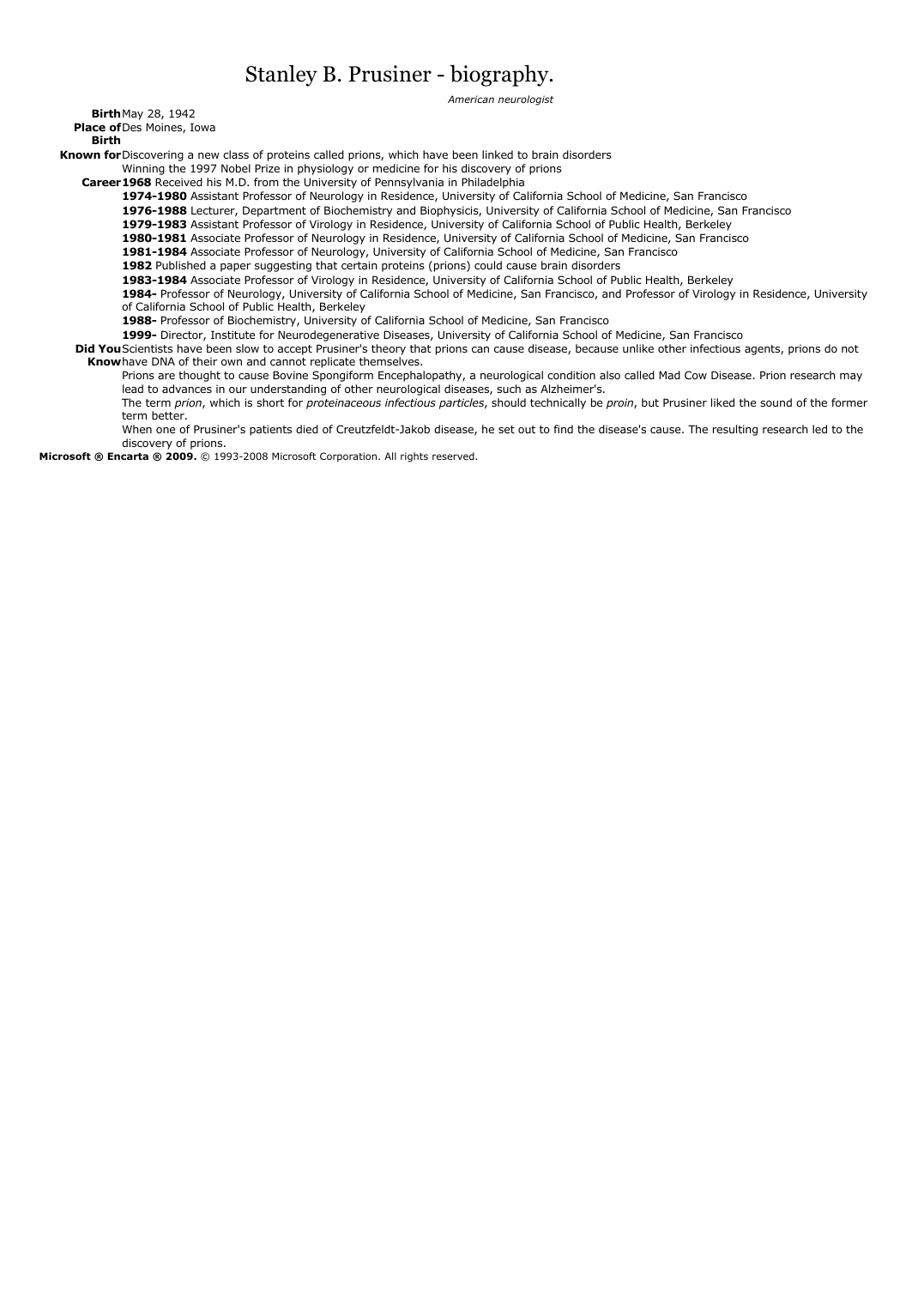Stanley B.
Publié le 06/12/2021

Extrait du document
Ci-dessous un extrait traitant le sujet : Stanley B.. Ce document contient 336 mots. Pour le télécharger en entier, envoyez-nous un de vos documents grâce à notre système d’échange gratuit de ressources numériques ou achetez-le pour la modique somme d’un euro symbolique. Cette aide totalement rédigée en format pdf sera utile aux lycéens ou étudiants ayant un devoir à réaliser ou une leçon à approfondir en : Echange
Stanley B. Prusiner - biography.
American neurologist
Birth May 28, 1942
Place of Des Moines, Iowa
Birth
Known for Discovering a new class of proteins called prions, which have been linked to brain disorders
Winning the 1997 Nobel Prize in physiology or medicine for his discovery of prions
Career 1968 Received his M.D. from the University of Pennsylvania in Philadelphia
1974-1980 Assistant Professor of Neurology in Residence, University of California School of Medicine, San Francisco
1976-1988 Lecturer, Department of Biochemistry and Biophysicis, University of California School of Medicine, San Francisco
1979-1983 Assistant Professor of Virology in Residence, University of California School of Public Health, Berkeley
1980-1981 Associate Professor of Neurology in Residence, University of California School of Medicine, San Francisco
1981-1984 Associate Professor of Neurology, University of California School of Medicine, San Francisco
1982 Published a paper suggesting that certain proteins (prions) could cause brain disorders
1983-1984 Associate Professor of Virology in Residence, University of California School of Public Health, Berkeley
1984- Professor of Neurology, University of California School of Medicine, San Francisco, and Professor of Virology in Residence, University
of California School of Public Health, Berkeley
1988- Professor of Biochemistry, University of California School of Medicine, San Francisco
1999- Director, Institute for Neurodegenerative Diseases, University of California School of Medicine, San Francisco
Did You Scientists have been slow to accept Prusiner's theory that prions can cause disease, because unlike other infectious agents, prions do not
Know have DNA of their own and cannot replicate themselves.
Prions are thought to cause Bovine Spongiform Encephalopathy, a neurological condition also called Mad Cow Disease. Prion research may
lead to advances in our understanding of other neurological diseases, such as Alzheimer's.
The term prion, which is short for proteinaceous infectious particles, should technically be proin, but Prusiner liked the sound of the former
term better.
When one of Prusiner's patients died of Creutzfeldt-Jakob disease, he set out to find the disease's cause. The resulting research led to the
discovery of prions.
Microsoft ® Encarta ® 2009. © 1993-2008 Microsoft Corporation. All rights reserved.
Stanley B. Prusiner - biography.
American neurologist
Birth May 28, 1942
Place of Des Moines, Iowa
Birth
Known for Discovering a new class of proteins called prions, which have been linked to brain disorders
Winning the 1997 Nobel Prize in physiology or medicine for his discovery of prions
Career 1968 Received his M.D. from the University of Pennsylvania in Philadelphia
1974-1980 Assistant Professor of Neurology in Residence, University of California School of Medicine, San Francisco
1976-1988 Lecturer, Department of Biochemistry and Biophysicis, University of California School of Medicine, San Francisco
1979-1983 Assistant Professor of Virology in Residence, University of California School of Public Health, Berkeley
1980-1981 Associate Professor of Neurology in Residence, University of California School of Medicine, San Francisco
1981-1984 Associate Professor of Neurology, University of California School of Medicine, San Francisco
1982 Published a paper suggesting that certain proteins (prions) could cause brain disorders
1983-1984 Associate Professor of Virology in Residence, University of California School of Public Health, Berkeley
1984- Professor of Neurology, University of California School of Medicine, San Francisco, and Professor of Virology in Residence, University
of California School of Public Health, Berkeley
1988- Professor of Biochemistry, University of California School of Medicine, San Francisco
1999- Director, Institute for Neurodegenerative Diseases, University of California School of Medicine, San Francisco
Did You Scientists have been slow to accept Prusiner's theory that prions can cause disease, because unlike other infectious agents, prions do not
Know have DNA of their own and cannot replicate themselves.
Prions are thought to cause Bovine Spongiform Encephalopathy, a neurological condition also called Mad Cow Disease. Prion research may
lead to advances in our understanding of other neurological diseases, such as Alzheimer's.
The term prion, which is short for proteinaceous infectious particles, should technically be proin, but Prusiner liked the sound of the former
term better.
When one of Prusiner's patients died of Creutzfeldt-Jakob disease, he set out to find the disease's cause. The resulting research led to the
discovery of prions.
Microsoft ® Encarta ® 2009. © 1993-2008 Microsoft Corporation. All rights reserved.
↓↓↓ APERÇU DU DOCUMENT ↓↓↓
Liens utiles
- STANLEY KRAMER
- Sir William Stanley?
- Sir Stanley Baldwin1867-1947Homme d'affaires, il entre au Parlement en 1908.
- Henry Stanley Journaliste et voyageur anglais.
- STANLEY KUBRICK


